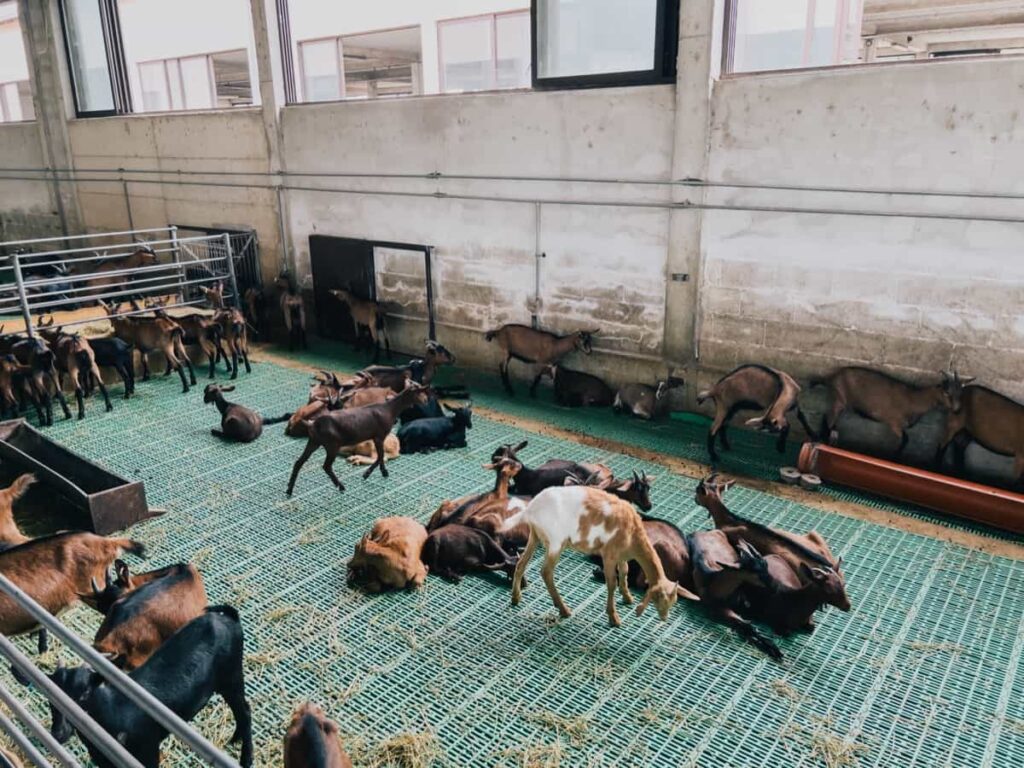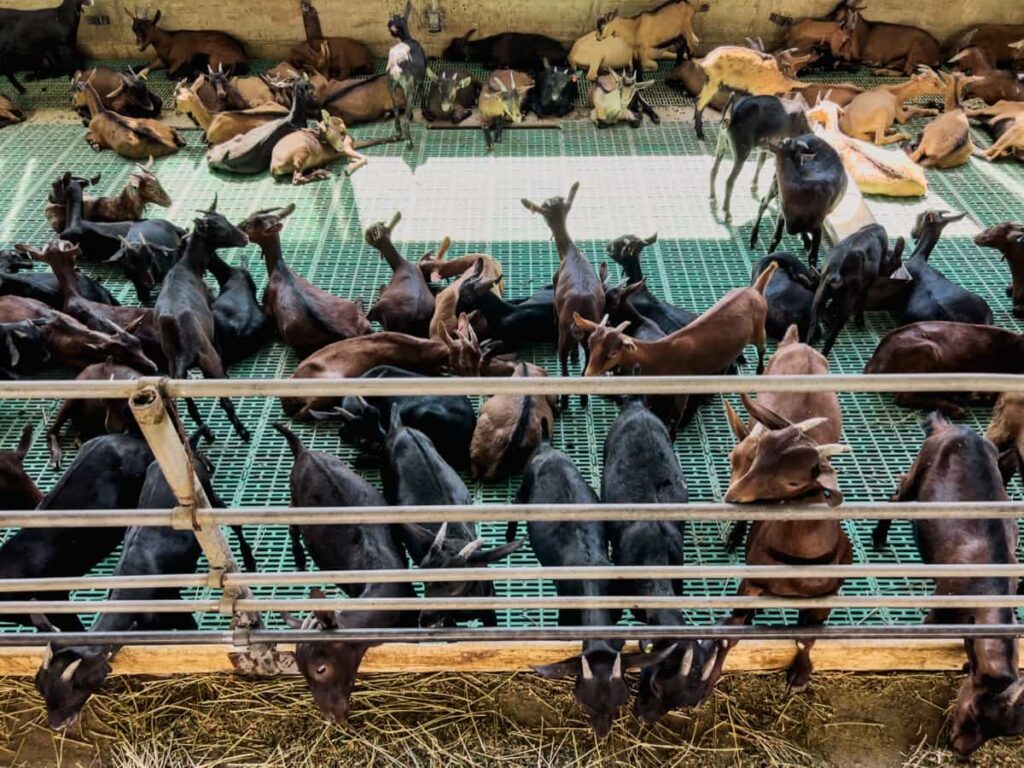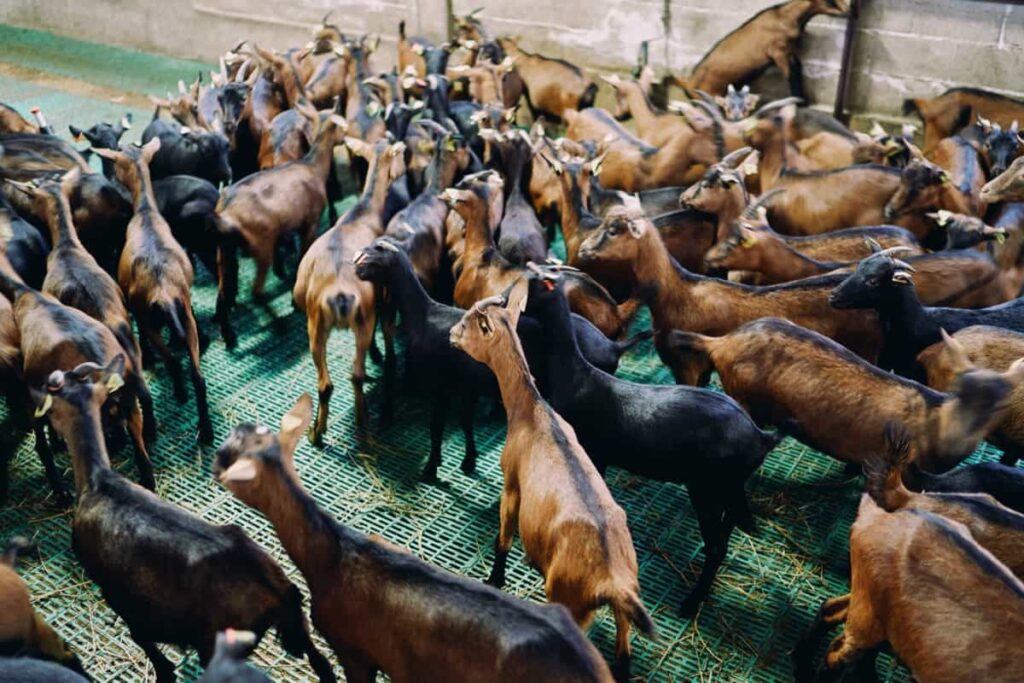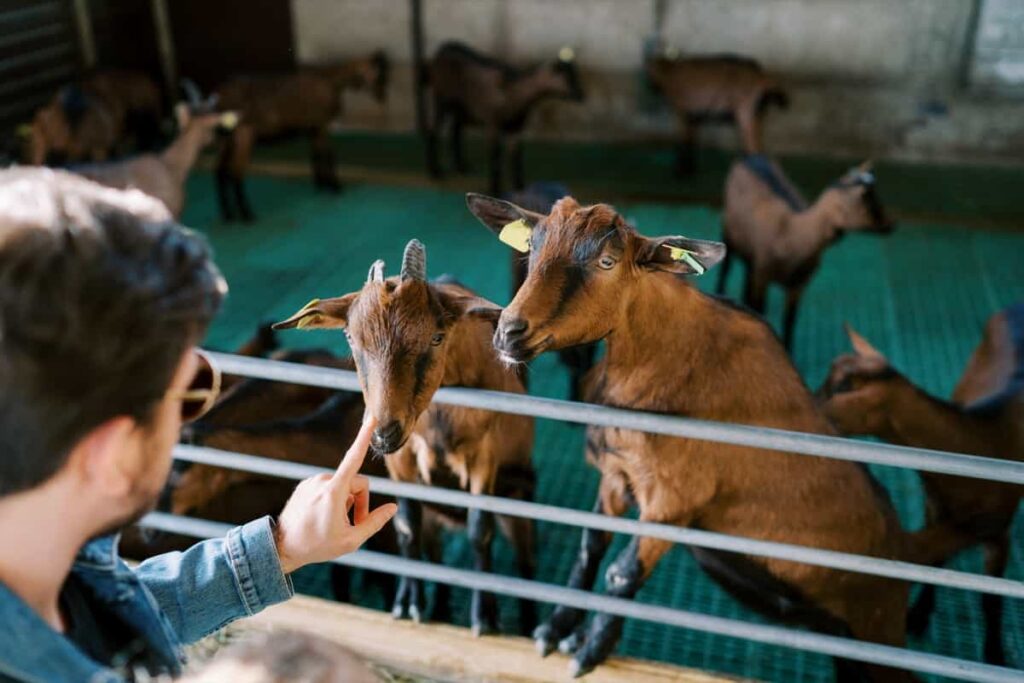Welcome to the world of Tamil Nadu Goat Farming, a thriving agricultural sector! Here, we’ll dive into the current state, explore unique breeds, and unravel the supportive policies and initiatives by the government that are shaping this vital industry.

Tamil Nadu Goat Farming
Tamil Nadu Goat Farming: An Overview of the Industry’s Current Status
In Tamil Nadu, goat rearing is a thriving industry that is essential to the rural economy. The state assists a large number of small-scale farmers and is well-known for its many goat varieties, including Kanni, Chevvadu, and Salem Black. The main purposes for which these goats are raised are for meat, milk, and wool, serving both regional and national markets.
This expansion has been made possible by the government’s encouraging policies, which include training initiatives and subsidies. Initiatives for breed improvement and health management also support the sector. Goat farming is, therefore, an essential part of Tamil Nadu’s agricultural fabric, providing a living for a large number of people and making a substantial contribution to the state’s agricultural output.
Different Breeds of Goats Found in Tamil Nadu and Their Characteristics
Kanni Adu
- Distinct for its tall, lean frame.
- Predominantly black or brown, often with white patches.
- Known for high-quality meat and adaptability to arid conditions.
Tellicherry Goat
- Large, with a predominantly black coat.
- Renowned for high milk yield and good meat quality.
- Hardy, suitable for mixed farming systems.
Salem Black
- Medium-sized with a glossy black coat.
- Valued for both meat and skin.
- Thrives in diverse climatic conditions.
Kodi Adu
- Smaller breed, known for unique curved horns.
- Primarily bred for meat.
- Adaptable to local environments, low maintenance.
Government Policies and Support for Goat Farming in Tamil Nadu
Intensive Goat Production System
- Eligibility: Farmers with at least ten goats for a year or more.
- Unit Support: Up to 95 female and 5 male goats, with smaller units for less-resourced beneficiaries.
- Support Includes:
- Metal feeders, silage pit, health cover packages, vitamin/mineral supplements.
- Estimated cost for a unit: Rs. 2,36,460.
- 100% subsidy provided, amounting to around Rs. 2.36 lakh per unit.
- The goal is to establish 1654 units across 21 states with an investment of Rs 39.00 crore.
Support for Conventional Goat Production
Cluster Development
- Identify clusters with around 2,000 goats within a 10 KM radius.
- Veterinary healthcare for registered goats.
Role of Goat Scouts
- Rural unemployed youth trained as Goat Scouts.
- Responsibilities include identifying clusters, registering names, and liaising with local Animal Husbandry Departments.
Provisions for Clusters
- Mass deworming, vaccination, specific mineral mixtures.
- Fattening with concentrate feed for 60 days before slaughter.
- 100% subsidy for supporting clusters, with each cluster costing around Rs. 5 lakh.
- Total cost for supporting clusters in 21 states: Rs. 21.00 crore.
In case you missed it: 21 Best Goat Farms in the USA: Top Farm Stores for Goat Milk Products along with Farm Tours, and Educational Programs

Financial Assistance and Incentives Provided by the Government for Goat Farmers in Tamil Nadu
NABARD Subsidy: Offers 25-35% subsidy for goat purchase and infrastructure. Eligibility includes being a farmer, entrepreneur, or skillful individual with proper facilities and transportation. Benefits include reduced investment costs and improved goat productivity.
Cooperative Crop and Interest-Free Loans: Available through Tamil Nadu’s cooperative societies, these loans support goat farming and other activities. You must be a cooperative society member with a Kisan Credit Card. They help manage cash flow and diversify income sources.
MCA, CGS, RFS Schemes: Targeted at Farmer Producer Companies (FPCs) in goat farming, these schemes offer financial assistance, credit guarantees, and working capital. FPCs need registration and a business plan. Benefits include increased creditworthiness and business expansion.
Role of Tamil Nadu State Agricultural University in Developing and Improving Goat Farming Practices
Improving goat farming techniques is a major responsibility of Tamil Nadu State Agricultural University (TNAU). They prioritize research and development with the goal of increasing sustainability and productivity. TNAU carries out extensive research on goat breeds, aiming to maximize milk supply, growth, and health. They provide farmers with training programs that transmit contemporary information and skills.
In addition, the institution promotes environmentally friendly agricultural methods that both boost productivity and preserve the environment. TNAU helps farmers generate more revenue by facilitating connections between farmers and markets via partnerships. Their noteworthy efforts in managing diseases have resulted in a decrease in goat herd fatality rates. To put it simply, TNAU has made a substantial contribution to the goat farming industry in Tamil Nadu via research, education, sustainability, market linkage, and health management.
Challenges Faced by Goat Farmers in Tamil Nadu and How the Government is Addressing Them
Goat producers in Tamil Nadu deal with a number of difficulties, including restricted grazing areas, high production expenses, water shortages, intermediary exploitation, and inadequate disease management. Their income and productivity need to be improved by these problems. The Tamil Nadu government has taken a number of actions to assist.
They safeguard farmers against low-price exploitation by providing subsidies for farming expenses and equipment, and they are now drafting legislation to guarantee minimum support prices for goat products. E-Thottam is an online portal that links farmers with experts and buyers, giving them access to government subsidies and market data. A commission is being established to suggest equitable pricing practices. Furthermore, subsidized mobile carts for nutrient-dense feed and cold storage facilities are offered.
Impact of Climate Change on Goat Farming in Tamil Nadu and Adaptation Strategies
Goat farming is essential to many farmers in Tamil Nadu since it produces meat, milk, and other items. However, there are a number of serious issues brought on by climate change, such as decreased fodder crop yields, heat stress, water shortages, and disease outbreaks in goats. There are many tactics that farmers might use to address these problems. They may choose goat breeds like Jamunapari and Boer that are more adapted to endure heat, drought, and illnesses.
In case you missed it: 15 Best Pet Goat Breeds: The Friendliest Goat Breeds Perfect for Pets and Farms

It’s also critical to provide goats with appropriate housing, cooling systems, and a balanced diet that includes vitamins and forage resistant to drought. To avoid diseases, health precautions like immunizations and biosecurity are crucial. Resilience may be raised by diversifying revenue streams via endeavors like crop gardening and beekeeping. Teaching farmers about sustainable methods and climate change is also essential. These actions assist in both minimizing the consequences of climate change and helping to adapt to it.
Market Trends and Opportunities for Goat Farmers in Tamil Nadu
Goat farming in Tamil Nadu is a booming industry with a lot of potential. The state, with its diverse landscapes, is ideal for raising various goat breeds. Tamil Nadu ranks high in goat population and meat production, catering to a strong demand for goat meat, known for its taste and health benefits. Prices for goat meat and milk are quite favorable, offering good income prospects for farmers. There’s also a market for goat by-products like skins and manure.
For those interested in goat farming, Tamil Nadu provides excellent opportunities. The state’s varied terrain supports different goat breeds, both indigenous like Kanni Adu and exotic like Beetal. The availability of natural feed and fodder is a big plus. This environment makes it an attractive option for small farmers and those without land, promising a sustainable source of income and employment.
Collaboration between Farmers, Government, and Private Sector to Boost Goat Farming in Tamil Nadu
In Tamil Nadu, a successful collaboration involving TANUVAS, DAHDF, and Goat Trust India is transforming goat farming into a more productive and profitable venture. This partnership focuses on overcoming challenges like inadequate breeding stock, limited veterinary services, and marketing difficulties. Key strategies include supplying farmers with better goat breeds at lower costs and setting up health camps and mobile veterinary clinics for affordable animal care. Additionally, farmer training programs are enhancing goat management skills.
The formation of Farmer Producer Organizations (FPOs) and Self-Help Groups (SHGs) is improving marketing and bargaining power. The initiative also works on branding and adding value to goat products, boosting demand and profitability. This collaboration has elevated farmers’ incomes and living standards, achieved government development goals, and provided the private sector with a dedicated market, showcasing goat farming’s potential for rural development and empowerment.
Future Prospects and Sustainability of Goat Farming in Tamil Nadu
With sustainability at its foundation, goat farming in Tamil Nadu has a bright future. Goat farming is becoming more popular in this historically agriculturally wealthy area since it requires less capital and has a high potential return. Goats are perfect for Tamil Nadu’s varied environment since they can adapt to a variety of temperatures and terrains.
The state promotes eco-friendly techniques and the preservation of regional breeds via its projects. Additionally, there is a growing market for goat dairy and meat, which could be lucrative for producers. Goat farming in Tamil Nadu is expected to flourish with government assistance and training initiatives, making a substantial contribution to both sustainable agriculture and the rural economy.
In case you missed it: Goat Farm Operations Management: Month-Wise Maintenance for Better Profits

Frequently Asked Questions (FAQ) on Tamil Nadu Goat Farming
Are There Any Environmental Concerns Associated with Goat Farming?
Overgrazing can be an issue, so sustainable grazing practices and proper land management are crucial to mitigate environmental impact.
What Are the Feeding Requirements for Goats In Tamil Nadu?
Goats in Tamil Nadu thrive on a diet that includes green fodder, dry fodder, and concentrates. Farmers often use locally available feed to reduce costs.
Conclusion
Tamil Nadu’s goat farming sector is thriving, with diverse breeds and substantial government backing. Policies focus on breed development, financial aid, and veterinary support, significantly bolstering this vital agricultural segment and benefiting local farmers.
- Aquaponic Farming at Home: A Step-By-Step Guide
- Profitable Village Farming Business Ideas in 2024
- High-Yield Aquaculture: Fast-Growing Fish for Farming
- Effective Fish Pond Construction Techniques for Beginners
- Irrigation and Water Management in Pineapple Farming
- Blossom to Harvest: Mastering Flowering and Pollination in Papaya Farming
- Pig Fattening Essentials: From Selection to Sale for Beginners
- Raising Wagyu Cattle: A Complete Guide for Premium Beef Production
- Soil Types and Their Water Holding Capacity
